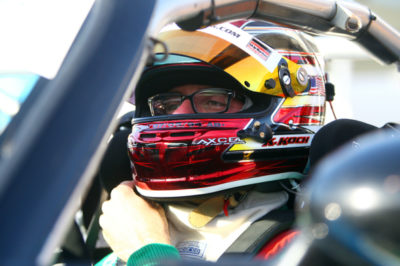Asked about preparation leading up to a race weekend and during it, we turned to Mazda scholarship driver Kenton Koch… In the past year or so I have started to realize how important it is to ensure that I have everything prepared for the race weekend. You may think I am talking about ensuring suits are clean, helmet and gloves are packed, etc. Sure, you’d better do that, but the list goes into more detail than you may think.
As a new race season approaches, I always think, “No way can next year be busier than last.” But it always is. If it isn’t, I suppose it is because you’re not building on what you learned from during the previous season. Tasks get tougher to keep track of and eventually one often starts to forget about things because he or she is too worried about the other. That’s where preparation comes into play. So, below I offer two keys to success during a race weekend – nutrition and planning. In a future article, I will discuss planning in order to execute value creation for your partners/sponsors during the race weekend.
We all know nutrition, including hydration, is important, especially if you’re in a closed cockpit car. You will be sweating a ton! I am no expert on this subject, but I do know people who are, and they have helped me find out what works for me. I will share what I have found to be most helpful and will also include a couple of links to videos to help you get started. Before the race weekend, hydration is very important to performing at your peak. Tip #1: You have to start this process at least a week before the event to be safe. Tip #2: It’s best to keep track of the color of your, well, “liquid,” in the morning during this period to measure your hydration level. The morning gives you the most accurate reading. It should be a very light yellow, almost clear. If it is dark yellow the night before a race, you’re not hydrated enough and need to prepare yourself better. Not drinking enough could lead you to a drop in performance, or worse, heat stroke. It is important to maintain that level of hydration during the weekend. Tip #3: I drink a bottle of Gatorade that’s watered down after each on-track session. I drink half the bottle of water and poor Gatorade in the other half. Small amounts of sugar are ok, but you don’t want to just be pounding back the Gatorades and protein bars that are high in sugar because you’ll have a burst of energy and then crash. My takeaway: Routines can help you stay hydrated. Since the race day is usually pretty busy, there isn’t a lot of time to grab a bottle of water. It must be a conscious effort to make sure you have water bottle at your disposal at just about any point in the day.
There is more to nutrition than fluids. Tip #4: I have three meals and then some snacks in between each day. Our body uses a lot of energy throughout the day and it’s important to keep fueling ourselves to perform at our best. Tip #5: The most important meal is breakfast, so make sure you get a balanced meal of fruits, protein, and carbs. I typically have some watermelon, toast, and eggs. After each session I eat a protein bar that’s low in sugar (usually less than 6g) to replenish my energy. For lunch I have some fruits and veggies with lean protein and carbs, then a couple more snacks between lunch and dinner. Tip #6: Other good snacks that provide great sources of energy are almonds and other nuts because they are a good source of fat (lipids), protein, and carbs. Then for dinner, the same: some fruits and veggies, lean protein and carbs. This sounds really simple, but things get busy throughout the weekend and it can be tough to get a hold of these things when you need them, which is where pre-weekend preparation comes into play.
Tip #7: Sit down a couple days before your event with an event schedule and piece of paper or computer. Write down what time you need to get up; how long it takes you to get ready; how long it takes you to eat; transit time to the track; times you’ll be on track and have appearances, such as autograph sessions, driver meetings; time it takes to get ready before getting into the race car; how long it will take to debrief with your engineer/team after the session; and the amount of time you need to look over your car and prep for the next session. At this point, you have good visibility on a busy schedule. Now is time to plan for success. Tip #8: Eat your meal approximately two hours before your session. If you have an early morning session, you’ll want to have your meal a couple hours before to let yourself digest, so that will effect what time you get up and eat. Tip #9: Consume a snack after each session and periods throughout the day, and a bottle of water whenever you can.
As you know, the track can be a busy place. If the day hasn’t gotten away from you and you stayed hydrated and fed, well done.
After dinner, it’s bedtime (yes, a bit trite, but even details on this are important, as studies show). Sleep will affect your performance the next day. Tip #10: Stay away from the TV or phone right before you go to bed—studies show that the blue light from these devices negatively effects how you sleep. So 30 minutes to an hour or so before you go to bed, have your bedside light on; read a book or perform any other low-light activity. Now, get ready to repeat tomorrow.
I hope this helps you think about what’s important rather than having to worry about remembering all the little things that are required to have a successful weekend; I know it sure helps me.


 ACCESSIBILITY
ACCESSIBILITY